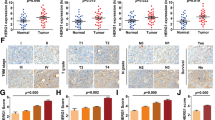Abstract
Esophageal cancer is one of the most common malignant tumors in the world, and its incidence is the eighth highest; meanwhile, its fatality rate is the sixth highest. The PI3K/Akt/mTOR signaling pathway plays a required role in human cancer, including cell survival, metabolism and migration. As a kind of important scaffold protein in mTORC2, RICTOR has showed over-expression in several malignancies like melanoma and endometrial cancer. In this research, we selected 201 cases of paraffin specimens from patients diagnosed as esophageal squamous cell carcinoma after surgical treatment and then estimated the RICTOR expression in each esophageal squamous cell carcinoma tissue by using the immunohistochemical streptavidin–peroxidase technique. Then, we analyzed the association among the clinicopathological parameters, the prognosis and the expression of RICTOR. Eventually, we found that the percentage of RICTOR-positive expression in 201 ESCC samples is 70.6% (142/201) and the figure for RICTOR-negative or RICTOR-doubtful-positive expression is 29.4% (59/201). RICTOR expression positively correlated with ESCC patients’ AJCC stage (P = 0.011) and showed an opposite trend with survival (P = 0.007). Based on univariate and multivariate Cox proportional hazards regression analysis, RICTOR-positive expression, AJCC staging III or IV and nodal metastasis are prognostic factors and the former two are independent risk factors for ESCC. In conclusion, our study showed potential that targeting RICTOR may represent new effective inhibitors for treating ESCC.


Similar content being viewed by others
Abbreviations
- EC:
-
Esophageal cancer
- ESCC:
-
Esophageal squamous cell carcinoma
- PI3K:
-
Phosphorinosmode-3-kinase
- Akt/PKB:
-
Protein kinase B
- mTOR:
-
Mammalian target of rapamycin
- mTORC1:
-
Mammalian target of rapamycin complex 1
- mTORC2:
-
Mammalian target of rapamycin complex 2
- AJCC:
-
American Joint Committee on Cancer
- IHC:
-
Immunohistochemistry
- SP:
-
Streptavidin–peroxidase
- PBS:
-
Phosphate-buffered saline
- K–M:
-
Kaplan–Meier
- HR:
-
Hazard ratio
- CI:
-
Confidence interval
References
Jemal A, Bray F, Center MM, et al. Global cancer statistics. CA Cancer J Clin. 2011;61(2):69–90.
Cohen DJ, Ajani J. An expert opinion on esophageal cancer therapy. Expert Opin Pharmacother. 2011;12(2):225–39.
Lagergren J, Lagergren P. Oesophageal cancer. BMJ. 2010;341:c6280.
Rustgi AK, El-Serag HB. Esophageal carcinoma. N Engl J Med. 2014;371(26):2499–509.
Merkow RP, Bilimoria KY, Keswani RN, et al. Treatment trends, risk of lymph node metastasis, and outcomes for localized esophageal cancer. J Natl Cancer Inst. 2014;106(7):dju133.
Ciocirlan M, Lapalus MG, Hervieu V, et al. Endoscopic mucosal resection for squamous premalignant and early malignant lesions of the esophagus. Endoscopy. 2007;39(1):24–9.
Geng Y, Wang H, Lu C, et al. Expression of costimulatory molecules B7-H1, B7-H4 and Foxp3 + Tregs in gastric cancer and its clinical significance. Int J Clin Oncol. 2015;20(2):273–81.
Cantley LC. The phosphoinositide 3-kinase pathway. Science. 2002;296(5573):1655–7.
Ellard SL, Clemons M, Gelmon KA, et al. Randomized phase II study comparing two schedules of everolimus in patients with recurent/metastatic breast cancer: NCIC Clinical Trials Group IND. 163. J Clin Oncol. 2009;27(27):4536–41.
Fasolo A, Sessa C. mToR inhibitors in the treatment of cancer. Expert Opin Investig Drugs. 2008;17(11):1717–34.
Author information
Authors and Affiliations
Corresponding authors
Ethics declarations
Conflict of interest
We declare we have no commercial or associative conflicts of interest related to this work.
Ethical approval
This study was approved by the Ethical Committee of The First Affiliated Hospital of Anhui Medical University. The results in this paper have never been published before by myself, by any co-author, or by others. All the participants provided an informed consent which was in line with the Declaration of Helsinki. There is no conflict of interest statement with all the references.
Additional information
Wei-Jia Jiang and Ru-Xue Feng have contributed equally to this work.
Rights and permissions
About this article
Cite this article
Jiang, WJ., Feng, RX., Liu, JT. et al. RICTOR expression in esophageal squamous cell carcinoma and its clinical significance. Med Oncol 34, 32 (2017). https://doi.org/10.1007/s12032-017-0894-5
Received:
Accepted:
Published:
DOI: https://doi.org/10.1007/s12032-017-0894-5




